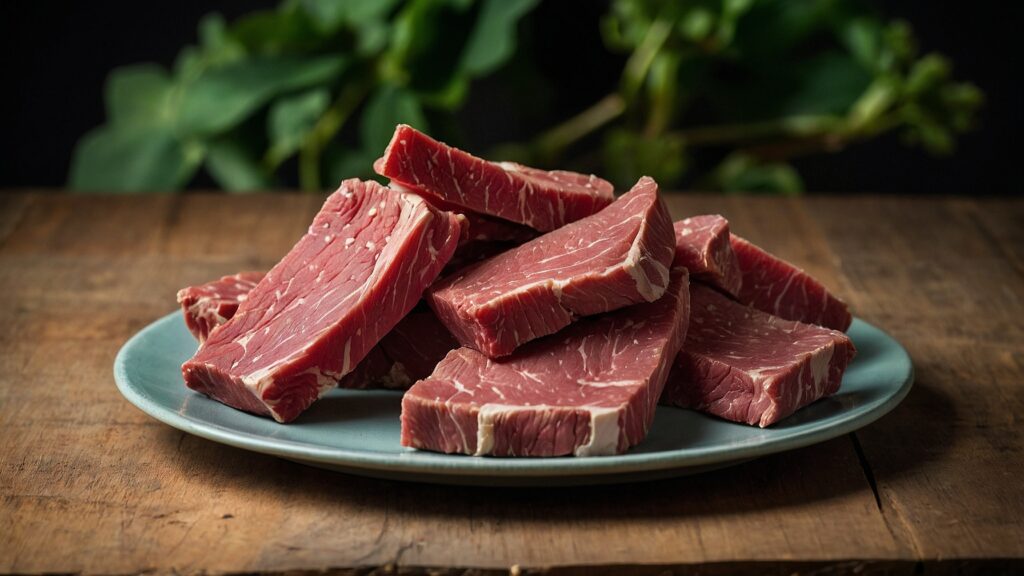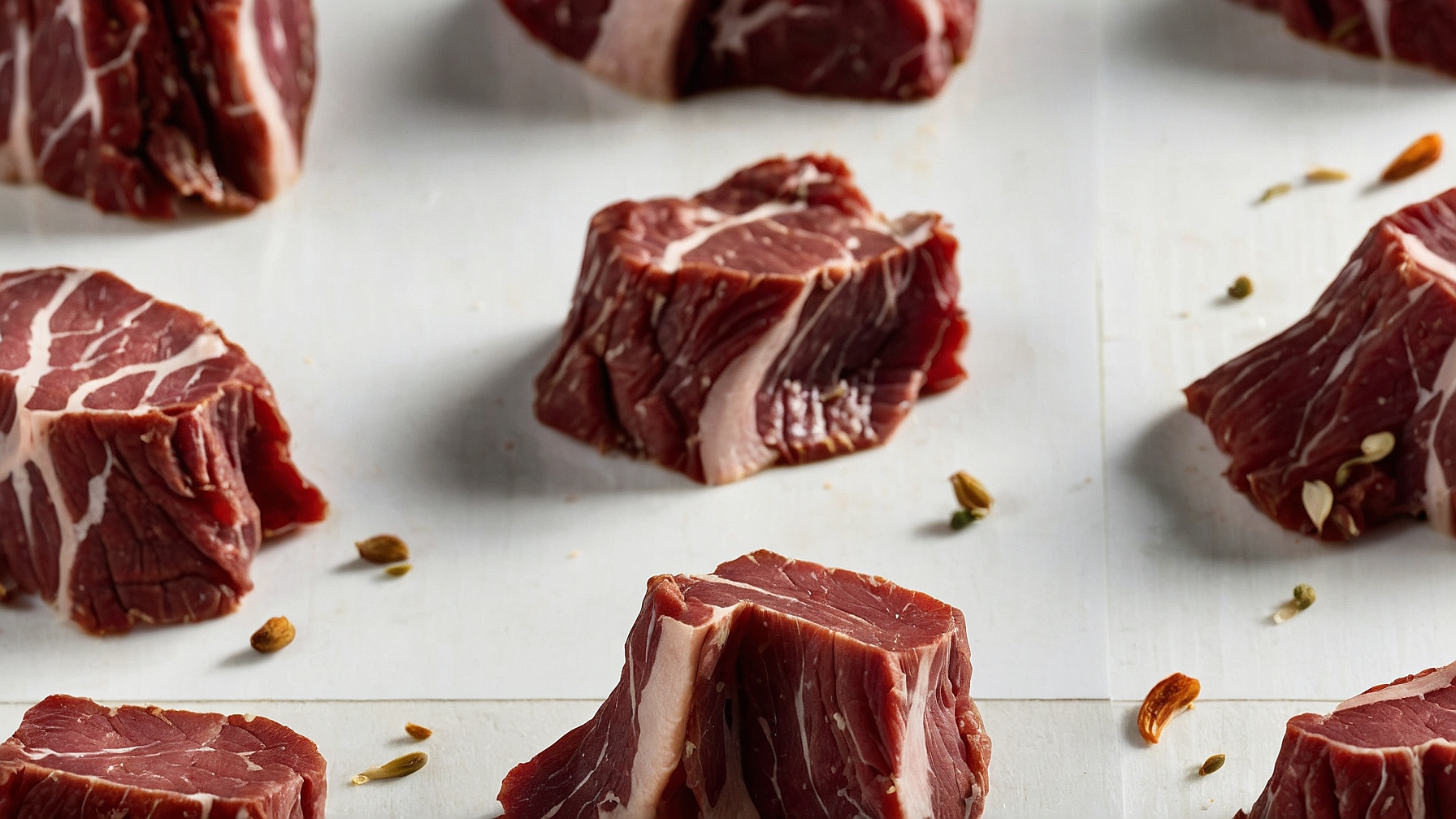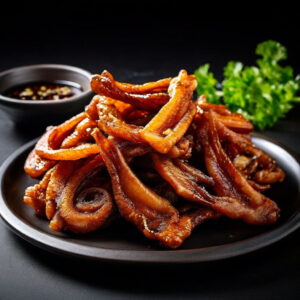Freeze dried beef liver has become an increasingly popular treat and supplement for cats. Its intense flavor and concentrated nutrition make it appealing. But is it safe and healthy to feed freeze dried beef liver to cats? This comprehensive guide will cover everything you need to know.
Table of Contents
What is Freeze Dried Beef Liver?
Freeze dried beef liver is raw beef liver that has had the moisture removed through a freeze drying process. This preserves the liver and leaves it with concentrated levels of nutrients.
The freeze drying process works by freezing the beef liver and then reducing the surrounding pressure to allow the frozen water inside the food to sublimate directly from solid phase to gas phase. This removes the moisture while retaining most of the nutritional value.
When freeze dried, beef liver has a dark red, chewy texture and is often sold in strips or small pieces. It has an intense, concentrated flavor due to the lack of moisture. Freeze dried beef liver can be stored long term without refrigeration.
Nutritional Value of Freeze Dried Beef Liver
Beef liver is already known as a nutritionally dense food. The freeze drying process makes it even more concentrated and nutrient rich. Some of the key nutrients found in freeze dried beef liver include:
- Protein – Beef liver is very high in protein, providing all essential amino acids. The freeze drying process concentrates the protein.
- Vitamin A – Beef liver contains extremely high levels of preformed vitamin A (retinol). Freeze dried liver provides this vitamin in very concentrated amounts.
- Vitamin B12 – An excellent source of vitamin B12. B12 supports nerve function and red blood cell formation.
- Riboflavin – Beef liver contains high levels of riboflavin, a B vitamin. Supports cellular function and energy production.
- Niacin – Also known as vitamin B3, supports glucose metabolism and cellular respiration.
- Iron – Beef liver contains heme-iron, which is highly bioavailable. Vital for oxygen transport.
- Copper – An essential mineral cats need in trace amounts. Supports metabolism.
- Zinc – Important for immune function, DNA synthesis, and growth.
- Taurine – An essential amino acid for cats that supports eye and heart function. Only found in animal sources.
As you can see, freeze dried beef liver is dense with proteins, B vitamins, minerals, and amino acids essential for cats. It provides a boost of natural nutrition in a concentrated form.
Benefits of Freeze Dried Beef Liver for Cats
Feeding your cat freeze dried beef liver offers several benefits:
Appealing Taste
Most cats love the intense, meaty flavor of beef liver. Even picky cats tend to enjoy these freeze dried treats. The crunchy outside and chewy interior provides sensory appeal.
Nutritional Boost
The concentrated nutrients in freeze dried beef liver offer a healthy boost for cats. Just a small amount provides high quality proteins, essential vitamins and minerals cats need.
Supports Immune System
The high vitamin A levels support a healthy immune system in cats. Vitamin A helps maintain the mucosal barriers and aids immune function.
Aids Digestion
The high protein and vitamin B12 content aid digestion. The natural enzymes help cats absorb nutrients. Fiber also helps move food through the digestive tract.
Fiber Helps with Hairballs
The high protein content comes with sufficient fiber, which helps move hair through the digestive system and reduce hairballs.
Promotes Liver Health
The nutritional content in beef liver, including copper, vitamin A, riboflavin and niacin support liver health and function.
So freeze dried beef liver can provide important health benefits for cats beyond just being a tasty treat. But is it safe? Let’s look at the potential risks.
Can Cats Eat Freeze Dried Beef Liver? Is Freeze Dried Beef Liver Safe for Cats?
In general, freeze dried beef liver is safe for cats to eat in moderation. However, there are some risks and precautions to consider:
- Digestive Upset – Too much liver can cause stomach upset, gas, or diarrhea. Introduce slowly.
- High Vitamin A Toxicity – Excessive vitamin A intake can cause toxicity. Feed freeze dried liver in moderation.
- Spoiled Liver Toxins – Spoiled liver contains toxins dangerous to cats. Only feed treats before expiration date.
- Bacteria Risk – Raw liver may contain Salmonella. Inspect pieces and practice food safety.
- Inspection Needed – Inspect each piece and discard any with mold or funny smells.
So while freeze dried beef liver can be fed safely, it does require taking precautions:
- Introduce slowly and feed in moderation
- Check expiration dates
- Inspect each piece for spoilage
- Practice food safety handling raw meat
Do not make freeze dried liver a significant portion of the everyday diet. It is best used as an occasional high value treat or supplement.
How Much Freeze Dried Beef Liver Can Cats Eat?

The proper dosage of freeze dried beef liver depends on the size, age, and health status of your individual cat. Some general guidelines include:
For the Average Adult Cat:
- Up to 2 pieces per day is reasonable for most cats
- No more than 10% of the daily caloric intake
- Start with even smaller amounts to assess tolerance
Adjust for Age and Health Factors:
- Kittens – Smaller amounts since kittens have lower caloric needs
- Senior Cats – Lower amounts due to decreased metabolism
- Obesity – Reduce treats to support weight loss
- Diabetes – Moderate treat intake impacts blood sugar
- Liver or Kidney Issues – Decreased amount, consult a vet
The best approach is to start with small amounts in the 1-2 treat per day range and adjust up or down based on your cat’s reaction. Their health, age, and condition will determine the ideal freeze dried liver dosage.
Tips for Feeding Freeze Dried Beef Liver Safely
Follow these tips for safely incorporating freeze dried beef liver into your cat’s diet:
- Break large pieces into smaller bits to control portion size. A little goes a long way.
- Refrigerate any unused freeze dried liver after opening the package to maintain freshness and prevent spoilage.
- Visually inspect each piece before feeding and discard any that look spoiled, moldy, or smell funny. Do not take risks.
- Stop feeding freeze dried liver if your cat experiences vomiting, diarrhea, or other signs of stomach upset.
- Consult your veterinarian about the appropriate portion and frequency for your individual cat based on health status.
- Rotate various treats to prevent your cat from developing an obsession over one type of treat. Variety is important.
Using common sense precautions makes freeze dried liver a safe, healthy treat for cats to enjoy in moderation. Always supervise your pet when introducing any new food.
Other Freeze Dried Cat Treats
Beyond beef liver, there are many other freeze dried meat and animal-based treats for cats:
Freeze Dried Chicken or Turkey
- Also rich in protein, amino acids, B vitamins
- Typically well tolerated like poultry
Freeze Dried Fish
- Provides omega-3 fatty acids from fish
- Only feed fish treats occasionally
Freeze Dried Organ Meats
- Heart, kidney, spleen also provide nutritional boost
- Focus on small serving sizes
Freeze Dried Eggs
- Highly digestible protein source
- Scrambled or freeze dried egg bites
Freeze Dried Cheese
- Most cats enjoy the flavor
- Lactose free cheddar or other cheeses
There are also some freeze dried fruits and vegetables designed as safe treats for cats to promote antioxidant intake. Always check that human foods are safe for feline consumption before feeding.
Should You Feed Your Cat Freeze Dried Beef Liver?
Now that you know more about the pros, cons, safety precautions, and proper dosage, should you feed your cat freeze dried beef liver? Here are some key considerations:
Benefits
- Nutritious concentrated protein and nutrients
- Natural source of taurine
- Appealing taste cats love
- Promotes liver health
- Fiber supports digestion
Potential Risks
- Too much can cause digestive upset
- High Vitamin A toxicity if overfed
- Risk of bacteria if spoiled or poorly handled
Conclusion: Freeze dried beef liver can be a beneficial supplement and treat in moderation. However, it should not become a significant staple of the everyday diet. Use common sense – small amounts, inspect each piece, adjust for health issues, and see how your individual cat reacts. Check with your veterinarian on introducing this supplement.
Where to Buy High Quality Freeze Dried Beef Liver Cat Treats
If you decide to incorporate freeze dried beef liver treats for your cat, be sure to purchase them from a reputable source. Here are some recommended brands:
Vital Essentials – All natural, raw freeze dried beef liver. Made in a USDA facility.
Sojos – Freeze dried raw beef liver with just one ingredient. Air dried for potency.
Stewart Pro-Treat – Natural beef liver freeze dried for high protein. Grain and filler free.
Feline Natural – New Zealand grass-fed beef liver. Gently freeze dried retaining enzymes.
You can find these high quality products at specialty pet food stores or online retailers like Chewy, PetCo, PetFlow, or Amazon. Check expiration dates and inspect packaging for damage or signs of spoilage.
Look for freeze dried liver cat treats that contain just a single ingredient – beef liver. Avoid products with unnecessary fillers, artificial flavors, colors, or preservatives. Seek brands that use USDA beef and meet quality standards. This ensures your cat gets nutritious treats that are safe to eat.
Frequently Asked Questions
How is freeze dried different from dehydrated?
Dehydrated food is dried at higher temperatures which can damage nutrients. Freeze drying removes moisture through vaporization, retaining more nutrition.
Is freeze dried liver cooked?
No, freeze dried beef liver retains its raw state to preserve natural enzymes, proteins, and nutrients that can be damaged by cooking.
Can you rehydrate freeze dried liver?
Yes, you can rehydrate freeze dried liver by soaking in water for 10-20 minutes until plump. This alters the texture but retains nutrition.
Does it need to be refrigerated?
Freeze dried liver is shelf stable for weeks if kept sealed and away from moisture. Refrigerate after opening for freshness.
Conclusion
Freeze dried beef liver provides cats with intense flavor and concentrated nutrition. When fed properly and in moderation, it can be a beneficial supplement. Be sure to introduce slowly, listen to your cat’s reaction, and adjust amounts based on health factors. Always inspect treats for spoilage and consult your veterinarian on diet changes. Use common sense, and enjoy watching your cat delight in these natural, freeze dried treats!
Reference
- Safety of By-Products as Animal Food. In M.F. Fuller (Ed.), Ingredients in Meat Products: Properties, Functionality and Applications. Springer US. https://doi.org/10.1007/978-0-387-71327-4_2
- Unconventional Diets for Dogs and Cats. Veterinary Clinics of North America: Small Animal Practice, 36(6), 1269-1281. https://doi.org/10.1016/j.cvsm.2006.08.003
- Get the Facts! Raw Pet Food Diets can be Dangerous to You and Your Pet. https://www.fda.gov/animal-veterinary/animal-health-literacy/get-facts-raw-pet-food-diets-can-be-dangerous-you-and-your-pet




